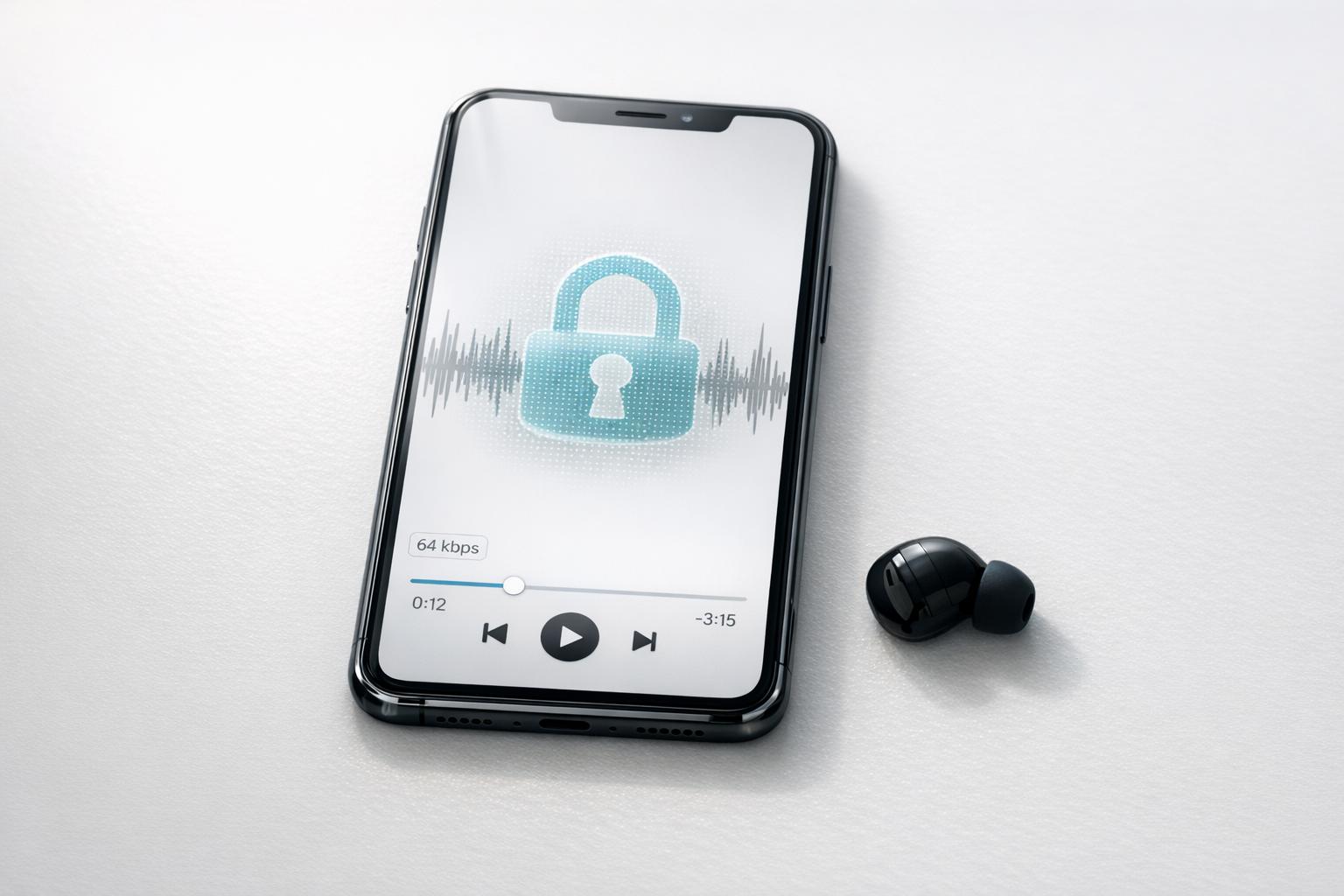Copyright term limits vary significantly across countries, impacting creators and users of creative works worldwide. Here’s a quick overview:
- Most countries follow the Berne Convention minimum: author’s life + 50 years
- Many developed nations extend this to life + 70 years
- Mexico has the longest term globally: life + 100 years
Key factors influencing copyright duration:
- Economic considerations
- Cultural attitudes towards sharing
- Technological advancements
- International agreements
Quick Comparison:
| Country/Region | Copyright Duration |
|---|---|
| Mexico | Life + 100 years |
| Colombia | Life + 80 years |
| US/EU | Life + 70 years |
| Many Asian countries | Life + 50 years |
Understanding these differences is crucial for creators working in multiple markets and for users seeking to legally access and use creative works.
Related video from YouTube
Key international copyright agreements
The Berne Convention: Basic rules
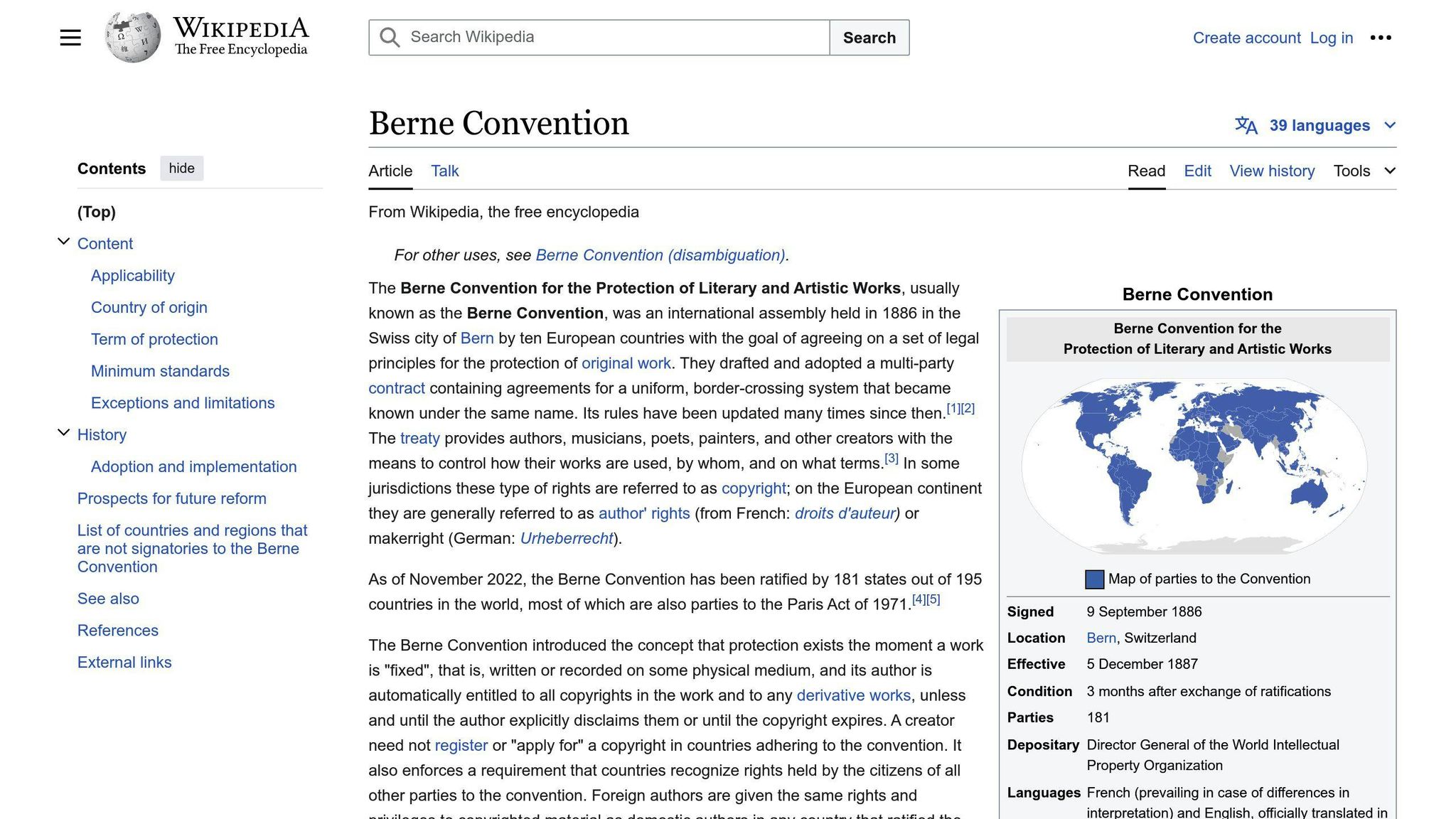
The Berne Convention, started in 1886, is the main international copyright law. It has three key points:
- National treatment: Member countries must protect foreign works the same as local ones.
- Automatic protection: Copyright is given without needing to register.
- Independent protection: Copyright in one country doesn’t depend on another country.
The Convention also set a minimum copyright term of the author’s life plus 50 years for most works.
TRIPS Agreement: Global standards
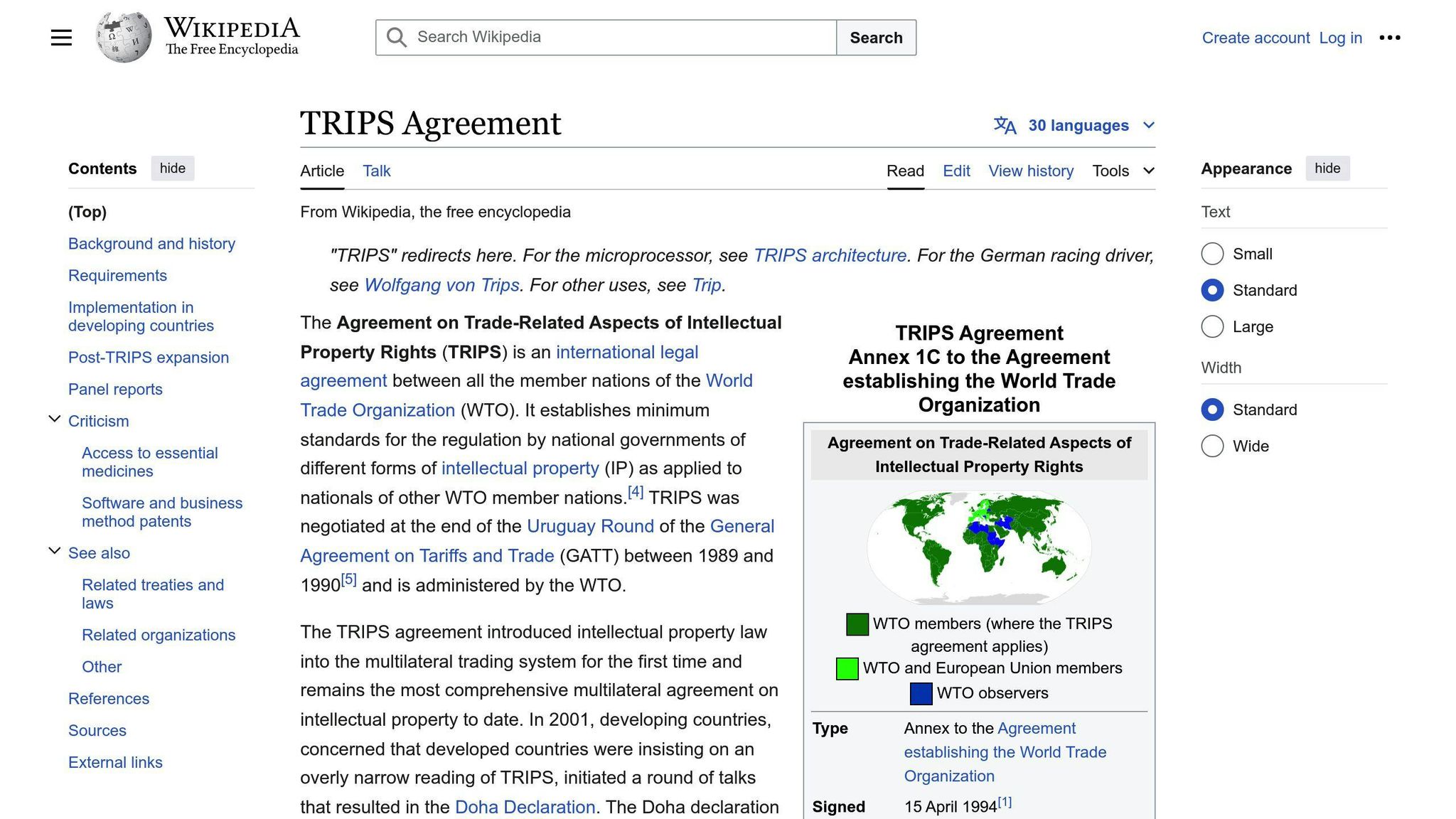
The TRIPS Agreement builds on the Berne Convention. It’s run by the World Trade Organization (WTO) and sets minimum rules for intellectual property among WTO members.
TRIPS does these things:
- Helps enforce copyright across countries
- Provides ways to solve disputes
- Includes computer programs and databases in copyright
WIPO Copyright Treaty: Digital works
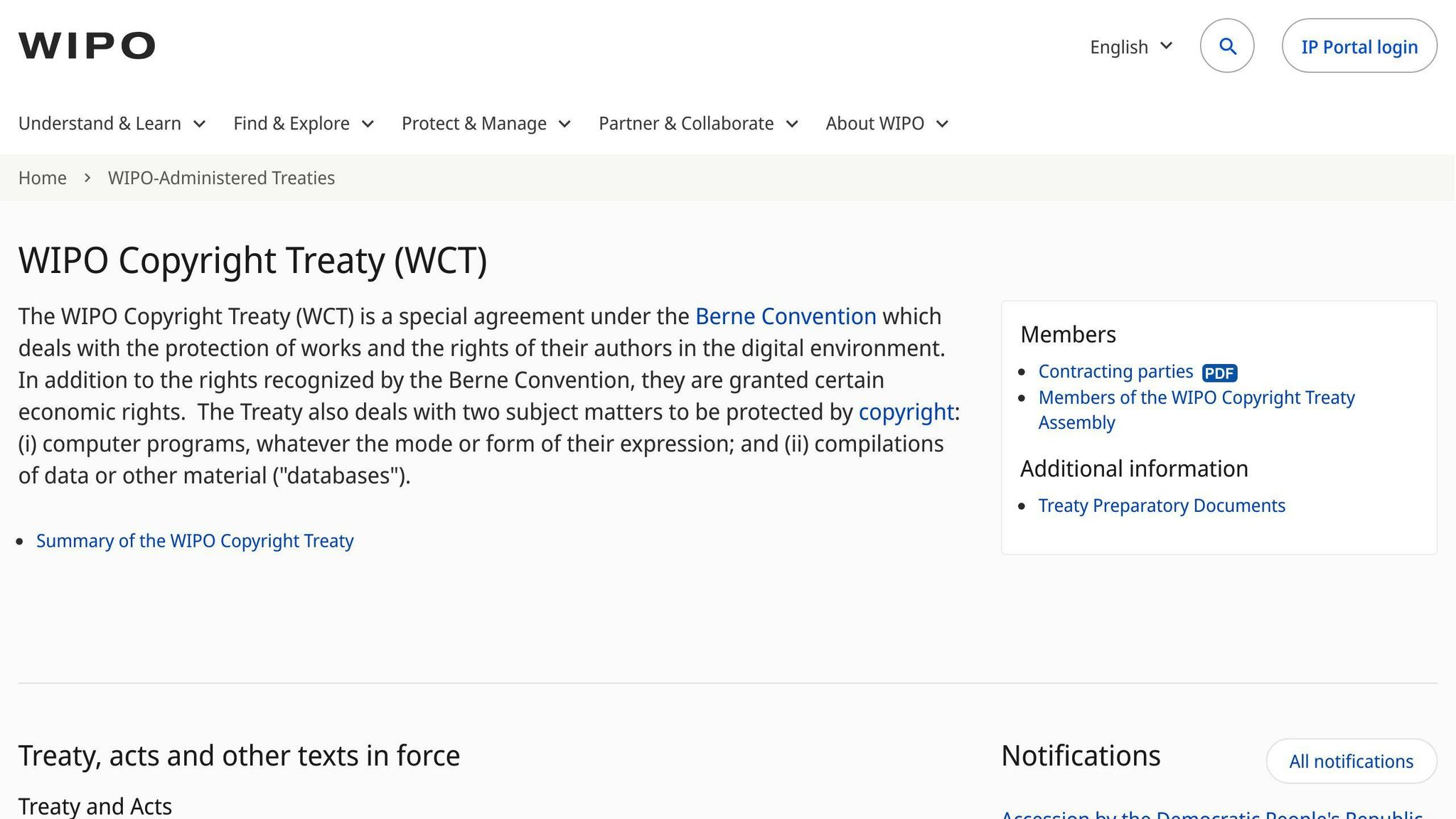
The WIPO Copyright Treaty (WCT), from 2002, deals with copyright in the digital age. It protects:
- Computer programs
- Databases
- Digital rights management tools
The WCT makes member countries stop people from getting around tech that protects copyrighted works.
Universal Copyright Convention: Less important now
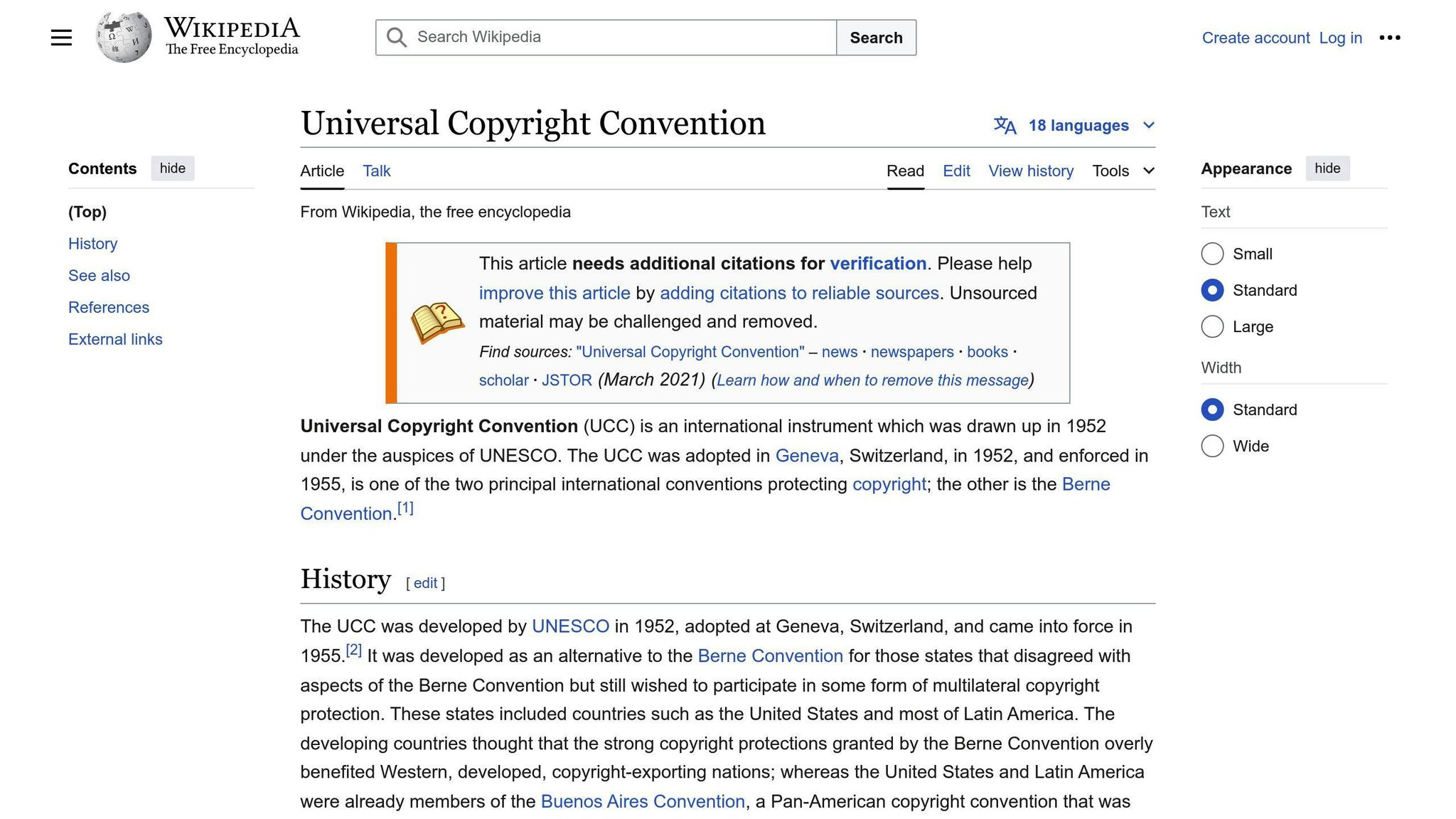
The Universal Copyright Convention (UCC) used to be important for aligning copyright laws worldwide. Now, it’s less useful because most countries use the Berne Convention and TRIPS Agreement instead.
| Agreement | What it does | How important it is now |
|---|---|---|
| Berne Convention | Sets basic rules, used by many countries | Very important |
| TRIPS | Helps with trade, solves problems | Key for global trade |
| WIPO Copyright Treaty | Protects digital works | Important for modern copyright |
| Universal Copyright Convention | Was an option besides Berne | Not very important anymore |
These agreements work together to protect creative works across different countries in today’s connected world.
What affects copyright duration?
Different things shape how long copyright lasts in various countries. These factors matter for people who create content for a global audience.
Money matters
How long copyright lasts affects money:
- Longer protection means creators can earn money for more time
- It can change how much copyrighted works cost and how easy they are to get
- Some studies show that very long copyright times might not always help society
Different views on sharing
Countries think differently about sharing creative works:
- Some focus on protecting the creator’s rights
- Others want more people to have access to art and knowledge
- These different views can lead to different copyright lengths
New tech changes things
New technology affects copyright length:
- Digital tools make it easier to copy and share works
- This has led to talks about how long copyright should last now
- Some people think it should be shorter because new ideas come faster now
Working with other countries
How countries trade and work together affects copyright:
- Countries often change their laws to match their trading partners
- Big agreements set basic rules for many countries
- Some countries, like the US, try to get others to have longer copyright times
| What affects copyright | How it changes things |
|---|---|
| Money | Can make copyright last longer |
| Views on sharing | Can make copyright different in each country |
| New tech | Makes people rethink how long copyright should last |
| Working with other countries | Pushes countries to have similar copyright times |
Knowing about these things helps creators understand copyright in different places. As the world keeps changing, staying informed can help creators make good choices about their work.
Copyright durations around the world
Different countries have different rules for how long copyright lasts. Let’s look at copyright terms in various parts of the world:
North America
In North America, copyright usually lasts a long time. For example:
- United States: Author’s life + 70 years (for works made after 1978)
Europe
Many European countries follow the European Union’s rules. For instance:
- Most EU countries: Author’s life + 70 years
- Spain: Author’s life + 79 years (longer than most)
Asia
Asian countries have different copyright terms. Many follow the basic rule of:
- Author’s life + 50 years
But some Asian countries have longer terms, like those in Western countries.
Oceania
We don’t have specific information about Oceania’s copyright terms. Many countries here likely follow common international rules.
South America
South America has some different copyright terms. For example:
- Colombia: Author’s life + 80 years (longer than many other places)
Africa
African countries can have different copyright terms. For instance:
- South Africa: Author’s life + 50 years
| Region | Example Copyright Duration |
|---|---|
| North America | US: Life + 70 years |
| Europe | Most EU: Life + 70 years |
| South America | Colombia: Life + 80 years |
| Africa | South Africa: Life + 50 years |
It’s important to know that:
- These terms can change for different types of work
- Some works might have special rules
- In South Africa, published books have their own 50-year rule
For people who make content for many countries, knowing these differences is key. It affects:
- How long they can make money from their work in each place
- How they share and license their content around the world
sbb-itb-738ac1e
Comparing copyright terms
Longest copyright terms by country
Some countries protect creative works for a very long time after the creator dies. Here’s a look at the longest copyright terms:
| Country | Copyright Duration |
|---|---|
| Mexico | Life + 100 years |
| Colombia | Life + 80 years |
| Spain | Life + 79 years |
| Ivory Coast | Life + 99 years |
Mexico has the longest copyright term in the world. This means creators and their families can control the use of their work for a century after the creator’s death.
Shortest copyright terms by country
Other countries have shorter copyright terms. Many follow the basic rule set by international agreements:
| Region | Common Copyright Duration |
|---|---|
| Asia (many countries) | Life + 50 years |
This shorter time tries to balance protecting creators’ rights with letting the public use and build on cultural works.
Special copyright duration rules
Some countries have different rules for copyright:
- In the U.S., works made before 1978 have different terms than newer works
- Some countries have shorter terms for photos or applied art
- Works made for hire or without a known creator often have set terms, not based on someone’s life
Copyright term comparison table
| Country | Copyright Duration | Notes |
|---|---|---|
| Mexico | Life + 100 years | Longest term globally |
| Spain | Life + 79 years | Used to be life + 80 years |
| Colombia | Life + 80 years | |
| United States | Life + 70 years | For works made after 1978 |
| Ivory Coast | Life + 99 years | |
| Most EU countries | Life + 70 years | |
| Japan | Life + 50 years | Common in many Asian countries |
This table shows how copyright terms differ around the world. People who create content for many countries need to know these differences. It affects how long they can make money from their work in each place and how they share their content globally.
What this means for content creators
Knowing about copyright terms in different countries is important for content creators who work globally. This knowledge helps creators protect, share, and make money from their work around the world.
Sharing content worldwide: Key points
When sharing work globally, creators should know:
- Works become free to use at different times in each country
- Creators may need to change how they share their work based on local laws
- It’s important to know about fair use in different places
Managing copyright in different countries
To handle copyright across borders, creators should:
- Keep good records of when they made their work and any copyright registrations
- Think about international copyright rules when planning to share work globally
- Talk to lawyers who know about copyright in different countries
Global market risks and rewards
Working in the global market has good and bad points for creators:
| Risks | Rewards |
|---|---|
| Work might be used without permission in countries with shorter copyright terms | More people can see and use the work |
| It’s hard to protect rights in many countries | Chances to work with others and make deals |
| Some countries protect copyright better than others | Possible to make money in more ways |
Creators should think about these things when deciding how to share and make money from their work around the world. Understanding copyright terms helps creators make good choices about protecting their work while reaching more people and making more money.
The future of copyright durations
Current talks about changes
People are talking about changing copyright laws. Here’s what’s happening:
- Some want all countries to have the same rules
- There’s debate about making copyright last longer or shorter
- People are thinking about how to handle work made by AI
How new tech might change copyright laws
New tech, especially AI, could change copyright laws:
1. AI-made works
- Who owns work made by AI?
- Some places might need new laws for non-human creators
2. Blockchain and smart contracts
- Could help track who owns what
- Might make it easier to follow copyright rules
3. Machine learning
- Could spot copied work more easily
- Might be hard to tell fair use from breaking rules
Will copyright laws become more alike?
Countries might make their copyright laws more similar because:
- Big agreements push for shared rules
- Online sharing makes it helpful to have the same rules
- New tech creates shared problems to solve
But laws won’t be exactly the same everywhere because:
- Countries think differently about owning ideas
- Rich and poor countries have different needs
- Countries have different ways of making laws
| Reasons for similar laws | Reasons for different laws |
|---|---|
| Big agreements | Different cultures |
| Online sharing | Different money needs |
| New tech problems | Different ways of making laws |
As things change, people who make content need to keep learning about copyright in different places.
Conclusion
Main points to remember
- Copyright length differs across countries
- Mexico has the longest term: life plus 100 years
- Most countries follow basic rules set by global agreements
- Copyright terms can change due to new laws and technology
- Knowing copyright length helps protect creators and guide legal use
- Public domain status depends on each country’s copyright length
Why staying updated matters
| Reason | Why it’s important |
|---|---|
| Protect your work | Keep control of your creations in different countries |
| Avoid legal trouble | Don’t use others’ work illegally by mistake |
| Use free works | Find and use works that are no longer protected |
| Work globally | Understand rules for sharing content worldwide |
| Prepare for changes | Be ready for new copyright laws |
1. Protect your work
Knowing copyright length helps creators keep control of their work and make money from it in different countries.
2. Avoid legal trouble
People and businesses need to know when they can use others’ work without breaking the law.
3. Use free works
Knowing when copyright ends helps people find and use works that anyone can use for free.
4. Work globally
As people share content worldwide, it’s important to know how copyright works in different places.
5. Prepare for changes
Keeping up with talks about copyright helps creators and users get ready for new rules.
FAQs
How long does copyright last in most countries?
In most countries, copyright lasts for:
- The author’s life
- Plus 50 to 70 years after their death
The Berne Convention sets a minimum of 50 years after death. Many countries, like the US and EU members, use 70 years.
Which country has the longest copyright?
Mexico has the longest copyright term:
| Country | Copyright Duration |
|---|---|
| Mexico | Life + 100 years after death |
This is the longest protection period and can’t be extended further.
Which country has the longest copyright law?
Mexico also has the longest copyright law:
| Country | Copyright Duration |
|---|---|
| Mexico | Life + 100 years |
| Spain | Life + 80 years |
Mexico’s term is longer than other countries with extended terms, like Spain.
What is the international copyright term?
There’s no single worldwide copyright term. Here’s what you need to know:
- The Berne Convention sets a minimum term for member countries
- This minimum is life of the author plus 50 years
- Countries can and often do set longer terms
- For example, the US uses life plus 70 years
Each country decides its own copyright duration, as long as it meets the minimum set by international agreements.
